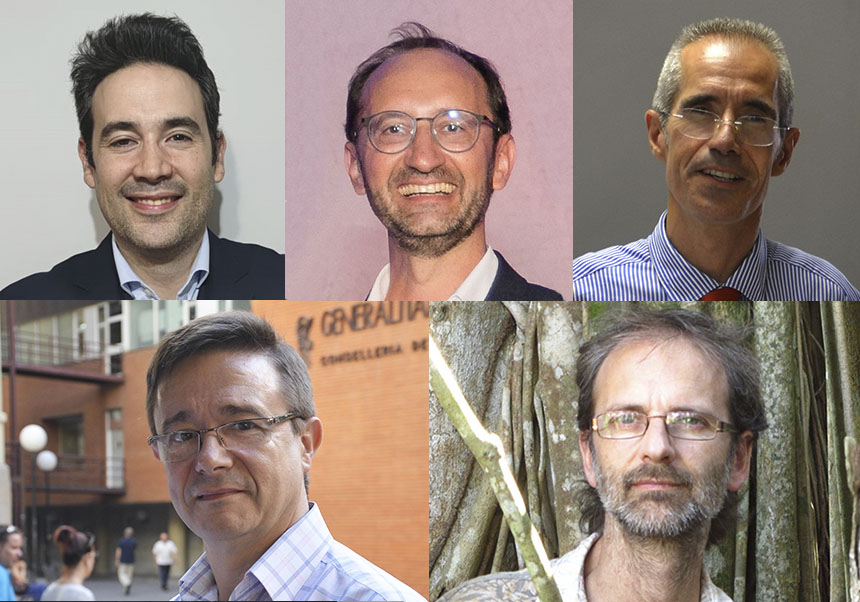
Gustau Camps-Valls, Francisco J. Barba, Andrés Cervantes, Juli G. Pausas and Domingo Ribeiro Soriano, researchers at the University of Valencia (UV), appear in the Highly Cited Researchers (HCR) 2023, a ranking that, according to the provider of bibliometric data Clarivate Analytics, includes the world’s scientific elite in terms of the number of citations of their research works.
Camps-Valls stands out in Geosciences; Barba, in Agricultural Sciences; Cervantes, in Clinical Medicine; and Pausas (scientist from the CSIC and the University of Valencia as a second affiliation, in the Desertification Research Centre) and Ribeiro have a multidisciplinary impact. In 2022, the University of Valencia had four specialists in this classification.
Highly Cited Researchers is an annual list that selects the most influential specialists from around the world for their exceptional research performance, measured by the production of highly cited articles that are in the top 1% in number of citations per field and year in Web of Science Core Collection. The list includes their scientific production during the period 2012-2022 in one or more of the 21 fields used.
The list contains around 7,125 researchers in 2023, approximately 6,800 of whom research in specific fields and the rest in multidisciplinary fields. They are selected for their exceptional performance in one or more of 21 fields (those used in the Web of Science Group’s Essential Scientific Indicators, or ESI) or across several fields (cross-field).
Gustau Camps-Valls is a full professor of Electronic Engineering at the UV and coordinator of the Image and Signal Processing (ISP) research group, http://isp.uv.es, a group of 50 researchers around artificial intelligence for the treatment of images, signals and data. His contributions focus on the development of machine learning algorithms for the analysis of remote sensing, Earth observation and geoscience data. He is the author of more than 300 articles in international journals, has coordinated more than 20 international research projects, holder of an ERC Consolidator Grant project and currently a Synergy Grant project – also from the European Research Council – to improve climate models. with AI and Earth system data.
Francisco J. Barba is a full-time professor at the Department of Preventive Medicine and Public Health, Food Sciences, Toxicology and Legal Medicine and coordinator of the ALISOST research group “Innovative Technologies for Sustainable Food”. He works on innovative food processing technologies (high hydrostatic pressures, electrical pulses, ultrasounds, microwaves and extraction with supercritical fluids) with the aim of obtaining new technological processes. Most of his studies are related to the application of these technologies to better and sustainably preserve the nutritional, bioactive and organoleptic characteristics of foods, as well as to valorise agri-food waste and by-products in a sustainable way. He has published more than 400 scientific articles in high-impact journals. He is currently one of the scientific coordinators of the AGROALNEXT program “Agri-Food Research Program” at the level of the Valencian Community, endowed with 9 million euros.
Andrés Cervantes is a full professor at the Department of Medicine at the University of Valencia, head of the Medical Oncology service at the University Clinical Hospital of Valencia and scientific and general director at the Health Research Institute (INCLIVA). His preferred areas of research are gastrointestinal cancer and phase I trials and the development of new drugs. At INCLIVA he highlights that he is a clinical researcher in rectal cancer and in the evaluation of the quality of mesorectal surgery. He has collaborated in the development of international clinical guidelines and is co-author of international cooperative studies that have modified clinical practice. He is the author of almost 500 articles and reviews of works published in different international journals, editor of the journal Cancer Treatment Reviews and president-elect of ESMO (European Society of Medical Oncology).
Juli G. Pausas works at the Desertification Research Centre (CIDE), a mixed entity of the University of Valencia, the Higher Council for Scientific Research and the Valencian Government, although she appears as the UV’s second affiliation in the list of Clarivate. His research focuses on the ecology and evolution of disturbance-prone ecosystems, specifically the role of fire in the evolution of species and the structure of populations, communities, and landscapes. He has worked specifically on Mediterranean ecosystems and savannahs, and has published more than 200 scientific articles and also four books on this topic. He currently studies the role of fire in biodiversity at different scales of organization (from the scale of individuals to the global scale).
Domingo Ribeiro-Soriano is a full professor of Business Organisation at the UV, coordinator of the doctorate program in Social Economy and co-director of the Institutional Chair DACSA-UV Group of Excellence and Development in Entrepreneurship: Student to Entrepreneur. His research affiliation is with the University Institute of Research in Social Economy, Cooperativism and Entrepreneurship (IUDESCOOP). His six contributions focus on entrepreneurship, consulting, innovation and technology. He is the author of more than 150 articles in international magazines, and has coordinated 6 European projects. He will be the founder of the Bancaja Chairs-Young Entrepreneurs group. He has belonged to different commissions of ANECA, together with the Autonomous Agencies of University Quality.
Highly Cited Researchers 2023 list: https://clarivate.com/highly-cited-researchers/









